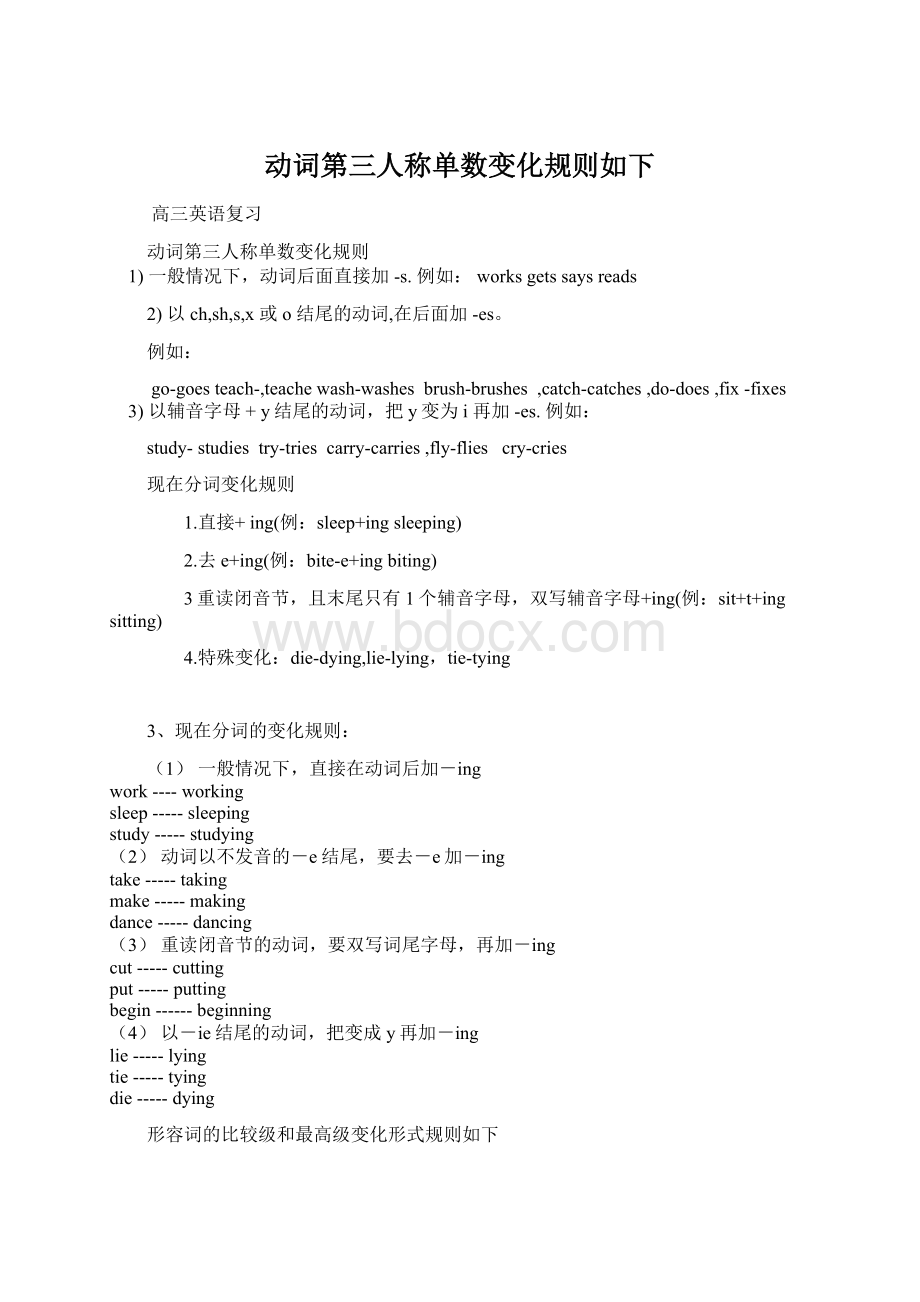动词第三人称单数变化规则如下.docx
《动词第三人称单数变化规则如下.docx》由会员分享,可在线阅读,更多相关《动词第三人称单数变化规则如下.docx(6页珍藏版)》请在冰豆网上搜索。

动词第三人称单数变化规则如下
高三英语复习
动词第三人称单数变化规则
1)一般情况下,动词后面直接加-s.例如:
worksgetssaysreads
2)以ch,sh,s,x或o结尾的动词,在后面加-es。
例如:
go-goesteach-,teachewash-washesbrush-brushes,catch-catches,do-does,fix-fixes
3)以辅音字母+y结尾的动词,把y变为i再加-es.例如:
study-studiestry-triescarry-carries,fly-flies cry-cries
现在分词变化规则
1.直接+ing(例:
sleep+ingsleeping)
2.去e+ing(例:
bite-e+ingbiting)
3重读闭音节,且末尾只有1个辅音字母,双写辅音字母+ing(例:
sit+t+ingsitting)
4.特殊变化:
die-dying,lie-lying,tie-tying
3、现在分词的变化规则:
(1)一般情况下,直接在动词后加-ing
work----working
sleep-----sleeping
study-----studying
(2)动词以不发音的-e结尾,要去-e加-ing
take-----taking
make-----making
dance-----dancing
(3)重读闭音节的动词,要双写词尾字母,再加-ing
cut-----cutting
put-----putting
begin------beginning
(4)以-ie结尾的动词,把变成y再加-ing
lie-----lying
tie-----tying
die-----dying
形容词的比较级和最高级变化形式规则如下
构成法
原级
比较级
最高级
①一般单音节词末尾加er和est
strong
stronger
strongest
②单音节词如果以e结尾,只加r和st
strange
stranger
strangest
③闭音节单音节词如末尾只有一个辅音字母,
须先双写这个辅音字母,再加er和est
sad
big
hot
sadder
bigger
hotter
saddest
biggest
hottest
④少数以y,er(或ure),ow,ble结尾的双音节词,末尾加er和est(以y结尾的词,如y前是辅音字母,把y变成i,再加er和est,以e结尾的词仍加r和st)
angry
clever
narrow
noble
angrier
cleverer
narrower
nobler
angrest
cleverest
narrowest
noblest
⑤其他双音节和多音节词都在前面加单词more和most
different
more
different
most
different
b.其他词都在前面加more,most构成比较级及最高级:
原级 比较级 最高级
important moreimportant mostimportant
difficult moredifficult mostdifficult
interesting moreinteresting mostinteresting
useful moreuseful mostuseful
I.学会下列形容词的比较级和最高级:
原级 比较级 最高级
1.tall taller tallest
strong stronger strongest
old older oldest
2.large larger largest
fine finer finest
late later latest
3.big bigger biggest
hot hotter hottest
thin thinner thinnest
4.easy easier easiest
busy busier busiest
happy happier happiest
5.valuable morevaluable mostvaluable
dangerous moredangerous mostdangerous
comfortable morecomfortablemostcomfortable
1.有几个形容词有特殊的比较级和最高级形式:
原级 比较级 最高级
good wellbetter best
bad illworse worst
many muchmore most
little less least
farfarther furtherfarthest furthest
oldolder elderoldest eldest
2.双音节词除了以“辅音+y”结尾的词外,还有以ow,er,le结尾的词,和个别其他双音节词,可以用加词尾的办法构成比较级和最高级:
原级 比较级 最高级
narrow narrower narrowest
clever cleverer cleverest
simple simpler simplest
common commoner commonest
3.也有少数单音节词可以加more和most的办法构成比较级和最高级:
原级 比较级 最高级
pleased morepleased mostpleased
tired moretired mosttired
glad moreglad mostglad
名词的复数形式
构成方法
例词
在词尾加-s
1. 以s、x、sh、ch结尾的名词后加-es
2. 如词尾是e,只加-s
如词尾为–f或–fe,则一般变为–ves
以辅音+y结尾的名词,变y为i再加-es
以元音+y结尾的名词,加-s
以辅音+o结尾的名词,加-es
以元音+o结尾的名词,加-s
以-th结尾的名词,加-s
英语里有一些名词的复数形式不是以词尾-s或-es构成,
构成方法
例词
变内部元音
foot[u]—feet[i:
]
man[ ]—men[e]
mouse[au]—mice[ai]
woman[ ]—women[e]
词尾加-en
ox—oxen(公牛)
child[ai]—children[i]
形式不变(通形名词----单、复数同形)
deer—deer
fish—fish
sheep—sheep
集合名词
(只有复数,没有单数。
)
trousers people(人,人民)
glasses(眼镜)
名词做定语
1. 只在后面名词加复数
2. man,woman随之后面的名词
而变化,后单其单,后复其复。
3. sport作定语永远用作复数。
1. appletree—appletrees
2. mandoctor—mendoctors
3. sportsshop sportsshoes
表示国籍的名词
(中日不变,英法变,其余词后加s)
Chinese—Chinese
Japanese—Japanese
Englishman—Englishmen
Frenchman—Frenchmen
American—Americans
其它名词复数的规则变化
1)以y结尾的专有名词,或元音字母+y结尾的名词变复数时,直接加s变复数:
如:
twoMarystheHenrys
monkey---monkeysholiday---holidays
比较:
层楼:
storey---storeysstory---stories
2)以o结尾的名词,变复数时:
a.加s,如:
photo---photospiano---pianos
radio---radioszoo---zoos;
b.加es,如:
potato--potatoestomato--tomatoes
c.均可,如:
zero---zeros/zeroes
3)以f或fe结尾的名词变复数时:
a.加s,如:
belief---beliefsroof---roofs
safe---safesgulf---gulfs;
b.去f,fe加ves,如:
half---halves
knife---knivesleaf---leaveswolf---wolves
wife---wiveslife---livesthief---thieves;
c.均可,如:
handkerchief:
handkerchiefs/handkerchieves
动词变名词
1.在词尾加er,r,双写加er或or:
A.play_player,sing_singer,wait_waiter,find_finder,
thrill_thriller,hunt-hunter
B.write_writer,drive_driver,come_comer,explore_explorer
dance_dancer
C.run_runner,win_winner,rob_robber,traval_travaller
D.visit_visitor,invent_inventor,act-actor,advise-advisor
2.在词尾加ing:
build_building,draw_drawing,end_ending,begin_beginning,
swim_swimming,skate_skating,feel_feeling,say_saying,
mean_meaning,cross_crossing,surf_surfing,paint_painting
3.在词尾加ion或去e加ion:
A.decide_decision,describe_description,produce_production,
celebrate_celebration,pronounce_pronunciation,decorate_decoration
graduate_graduation,frustrate-frustration,pollute_pollution
contribute_contribution,congratulate_congratulation,
educate_education,organize_orgnization,donate_donation,
appreciate_appreciation,operate_operation,invite_invitation
B.discuss_discussion,invent_invention,attract_attraction
impress_impression,inject_injection,instruct_instruction
4.其它:
know_knowledge,please_pleasure,enjoy_enjoyment,
practise_practice,die_death,succeed_success,weigh_weight,
sit_deat,change_chance,enter_entrance,fly_flight,
rob_robbery,discover_discovery,faile_failure,appear_appearance,
breathe_breath
如有侵权请联系告知删除,感谢你们的配合!
如有侵权请联系告知删除,感谢你们的配合!